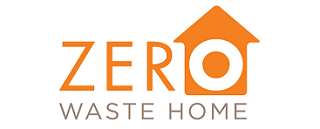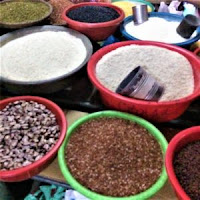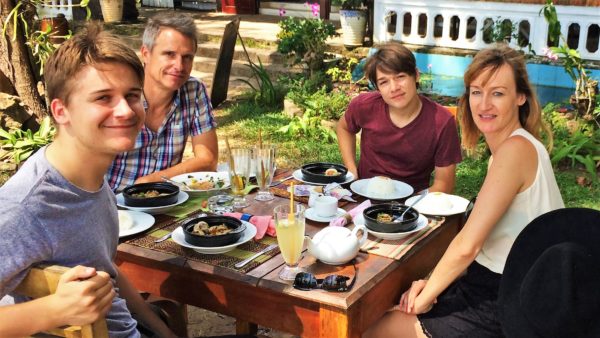Speaking tours allow me to spread the lifestyle worldwide but each stop brings me so much more!
The people I meet, the places I visit, the food I try, the things I learn…
In Japan, I autographed the Japanese version of my book, experimented with their automated bidets and savored the quality of sushi you can’t get at home. In Thailand, I read Buddha, learned to ride a motorcycle, and ran through fields with only thunderstorm lightning to lead me back to my hotel in the darkness after my talk (Thank you Googlemaps). In Taipei, I celebrated the launch of the traditional Chinese version of my book with my translator, Jessica, a traditional Chinese medicine student: I became one of her patients for a day (more on that later). In Singapore, Olivia introduced me to Tzu Chi and kaya toast (I’m on a personal quest to reproduce it at home). In Beijing, I rode bikes with Carrie, visited the market and climbed the Great Wall (check off my bucket list). In Malaysia, Aurora and her zero waste group honored my visit with a zero waste festival, and treated me to Durian fruit (something like a vegan alternative to camembert, but nonetheless delicious). In Vietnam, my family joined me for a vacation filled with unforgettable adventures and food experiences. In Hong Kong, the (luxurious) Landmark Mandarin Orientalhotel hosted not only my talk with Fanny, but also my stay – and by “luxurious”, I mean, they had unpackaged macarons displayed in a clear refrigerated case on the wall! If my two hungry teenagers hadn’t refused the meal on the flight over, I would have had time to take a picture for you
I come back from Asia blown away. Not only by the vibrant zero waste community I had no idea I had inspired there, but also by the new “ways” I learned. Every part of the world harbors secrets on getting close to zero. In sharing those that we discover through our travels, we have the power to inspire others to do the same in their part of the world – and if all the pieces of the puzzle come together, we’ll ultimately create a zero waste society, right?
Here Are 10 Things That I Learned From My Speaking Tour In Asia (Not In A Specific Order):
1. You Can Buy Prescription Meds In Bulk In Taipei.
In Taipei, I lost my voice. Quite an inconvenience when you’re kicking off a speaking tour! Everyone tried to help me: The cab driver offered Strepsils, my publisher herbal teas, a talk host peppermint drops, a store owner a honey tea, my audience herbal lozenges in all forms, Jessica acupuncture dots in my ears, her fiancé (a western medicine doctor) a prescription for steroids… He took me to a pharmacy, conversed with the pharmacist and to my surprise, asked me if I had a container to put the pills in! Yep, meds in bulk: This was a first for me!
2. More Face Masks Than Hair Ties Litter The Streets.
If you read this post or follow my Insta stories, you know about my obsession for ponytail holders: I find them everywhere in the US (today alone, I found 5 on a 2 hour walk). Despite my “radar” for them, I only found one during this month-long trip through Asia: Does Asian hair hold onto ties better than western hair? Do people not buy them there or are they more careful about not losing them? The answer remains a mystery.
3. Bulk Is Everywhere!
The markets are plenty and filled with options.
Ironically, I found that places dealing with litter issues happen to also have the most unpackaged options! Vietnam for example, is sadly one of the most littered places I have visited this decade…
and yet it has the most bulk that I have seen anywhere too.
4. Taiwan Makes An All-Natural Toothbrush.
Those of you who’ve tried to give me a freebie or sample on one of my tours, know that I systematically refuse material gifts, but when Feel Good approached me with their all natural toothbrush, I could not resist. I wanted to try it! If it works for our family, we’ll be closer to zero waste next year! Note: I also accepted a menstrual cup on this tour (after 10 years of use, mine started to fall apart – I embraced the new one but added the old one to our emergency earthquake kit).
5. Alternatives To Bottled Water Are Plenty.
When I visited Asia 20 years ago, I drank bottled water only, and so do most visitors today. But with the zero waste lifestyle and my “new vision” for all things bulk and unpackaged this time around, I found that going bottle-less is actually quite simple. If you train your eye to find filtered water, you actually find it everywhere (and at night, you can always boil tap water in your hotel room with the electric kettles provided). Here are a few examples:
Bonus: At this resort, they don’t even sell bottled water or use disposable straws. They use bamboo straws and ask their customers to use filtered water (an empty bottle is made available in each room for that purpose).
6. Blowing Your Nose In Asia Is Rude.
This is not waste-related, but I thought I’d share this with you if you plan on visiting Asia and are as clueless as I was… With the size of my European nose, the occasional sneeze and drip from eating spicy foods, I always carry a hankie and I am not shy to use it when needed. I am now embarrassed to write that I did blow my nose in public in Asia, only to find out upon my return to the US, that it is rude to do so there. Just as rude as spitting and farting in public are, in my part of the world: Yikes! Live to learn…
>> I’LL SPARE YOU THE VISUAL ON THIS POINT<<
7. Kuala Lumpur Has A Bulk Shop.
During my trip in Malaysia, I had the pleasure to visit The Hive Bulk Foods and meet its founder, Claire Sancelot. A vibrant chatty French lady, she was inspired by my book and that of Dominique Loreau to simplify her life and ultimately open an unpackaged store. She aims at bringing a wide selection of bulk, organic, gluten free, paleo and vegan products, while supporting local communities and charities as much as possible. They organize workshops, classes to a more sustainable living too. Quite a feat! Here are some pics to inspire you to open such store in your neck of the woods:
to simplify her life and ultimately open an unpackaged store. She aims at bringing a wide selection of bulk, organic, gluten free, paleo and vegan products, while supporting local communities and charities as much as possible. They organize workshops, classes to a more sustainable living too. Quite a feat! Here are some pics to inspire you to open such store in your neck of the woods:
8. Tzu Chi Centers Separate Donations For Recycling Like Nowhere Else.
Throughout Asia, this Buddhist organization has centers that accept a variety of materials. Plastics, paper, cans, wire, etc. Young and old alike volunteer to sort, separate and dismantle the donated materials with a discipline and dedication, like I’ve never witnessed in any other recycling center in the world. Here are a few examples:
Women go through books and binders,
page after page,
to separate white from colored.
Rings are removed from binders
but the vinyl is cut and then
removed to separate the cardboard.
Thick wires go through a stripper,
but those too small are stripped by hand,
to collect the copper.
9. The Subway Uses A Refillable Card Or Coin System For Visitors.
This is something that France seriously needs to consider. I still use disposable paper tickets there when I use the metro in Paris! They could just as well adopt the reusable system as found in Asia. Drop the coin in, and the door opens…Oh! and when I was given a luggage tag for my carry-on on the express bus to the Taipei airport, I stuck the luggage sticker back on the label upon arriving, and my driver took it back to reuse.
All over the world, zero wasters are working really hard to get their city to pick up organic, compostable waste; especially in dense areas, where apartment dwellers are not keen to using an indoor electrical composter or
worm farm. In the district of Beijing however, the bins are there. The contents are very contaminated for now, but at least the city has the system in place for when people will be ready (or informed on how) to use them. In Vietnam, recycling is typically organized by individuals (scrap brokers known as “dong nat” or “ve chai”) rather than by the city. But in Hoi An, we found a compost receptacle reserved for tourists (“organics recycle bin for tourists”) – only I did not have time to verify its contamination level because our bikes were getting towed!
(Apart from my nose blowing mishap), I hope that my recap will inspire you to introduce some of these ideas to your part of the world if they do not yet exist.
Upcoming speaking tours will take me through the US in April, Eastern Europe in May, and Namibia in June. I can’t wait to find out and share with you what I’ll discover on these!
































































